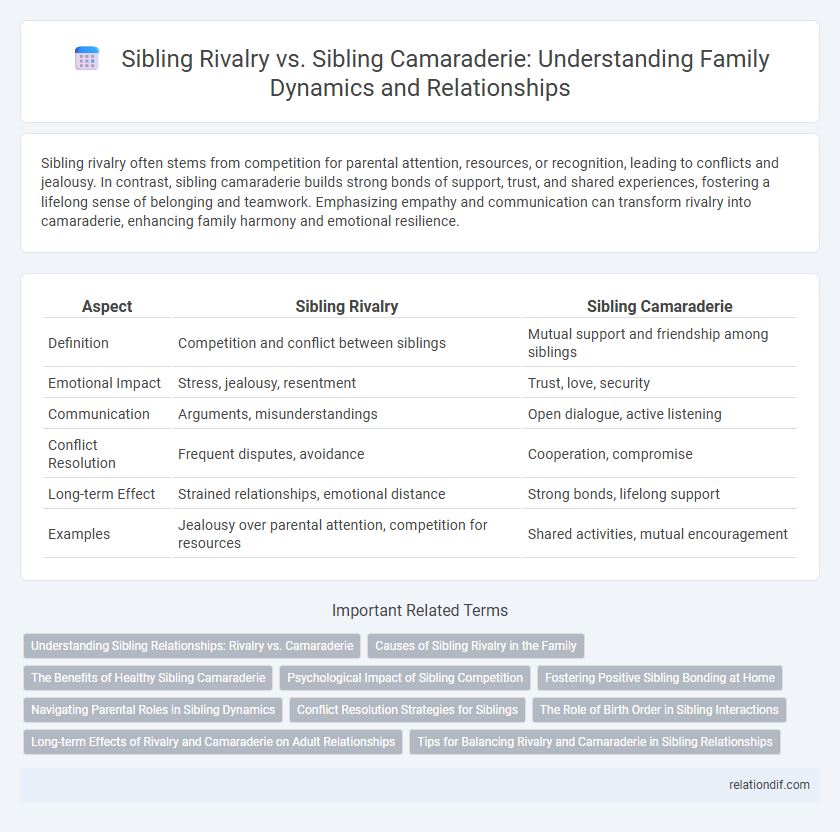Sibling rivalry often stems from competition for parental attention, resources, or recognition, leading to conflicts and jealousy. In contrast, sibling camaraderie builds strong bonds of support, trust, and shared experiences, fostering a lifelong sense of belonging and teamwork. Emphasizing empathy and communication can transform rivalry into camaraderie, enhancing family harmony and emotional resilience.
Table of Comparison
| Aspect | Sibling Rivalry | Sibling Camaraderie |
|---|---|---|
| Definition | Competition and conflict between siblings | Mutual support and friendship among siblings |
| Emotional Impact | Stress, jealousy, resentment | Trust, love, security |
| Communication | Arguments, misunderstandings | Open dialogue, active listening |
| Conflict Resolution | Frequent disputes, avoidance | Cooperation, compromise |
| Long-term Effect | Strained relationships, emotional distance | Strong bonds, lifelong support |
| Examples | Jealousy over parental attention, competition for resources | Shared activities, mutual encouragement |
Understanding Sibling Relationships: Rivalry vs. Camaraderie
Sibling relationships often oscillate between rivalry and camaraderie, each influencing emotional development and family dynamics. Rivalry can stem from competition for parental attention and resources, while camaraderie fosters shared support, cooperation, and lifelong bonding. Understanding these dynamics helps in nurturing positive interactions and resolving conflicts to strengthen family cohesion.
Causes of Sibling Rivalry in the Family
Sibling rivalry often stems from competition for parental attention, where children perceive unequal affection or resources, leading to feelings of jealousy and resentment. Differences in personality, age gaps, and varying parental expectations can exacerbate conflicts, intensifying misunderstandings and power struggles among siblings. Environmental factors, such as family stress or changes like divorce or relocation, further contribute to tensions that disrupt sibling camaraderie.
The Benefits of Healthy Sibling Camaraderie
Healthy sibling camaraderie fosters emotional support, enhancing resilience and social skills throughout life. Strong sibling bonds contribute to improved mental health, reducing stress and feelings of loneliness. Shared positive experiences between siblings promote cooperation, empathy, and lifelong friendship, strengthening overall family dynamics.
Psychological Impact of Sibling Competition
Sibling rivalry often triggers stress, anxiety, and reduced self-esteem, negatively impacting emotional development and family cohesion. In contrast, sibling camaraderie fosters resilience, social skills, and a supportive environment that enhances psychological well-being. Research indicates that balanced competition promotes motivation and personal growth, while excessive rivalry leads to long-term feelings of inadequacy and interpersonal conflict.
Fostering Positive Sibling Bonding at Home
Encouraging shared activities and open communication significantly reduces sibling rivalry while promoting camaraderie among brothers and sisters. Establishing family routines that emphasize teamwork and mutual respect fosters a supportive home environment where positive sibling bonding thrives. Parents play a crucial role by mediating conflicts fairly and celebrating individual achievements to strengthen sibling relationships.
Navigating Parental Roles in Sibling Dynamics
Parental roles significantly influence the balance between sibling rivalry and camaraderie, shaping children's interactions and emotional development. Clear, consistent boundaries set by parents reduce conflicts and promote cooperative behavior among siblings. Effective parental guidance encourages empathy and communication, fostering lasting sibling bonds and minimizing rivalry.
Conflict Resolution Strategies for Siblings
Effective conflict resolution strategies for siblings emphasize open communication, active listening, and empathy to transform rivalry into camaraderie. Establishing clear boundaries and promoting cooperative problem-solving helps siblings understand each other's perspectives and reduces competition. Consistent parental guidance that models respectful behavior further supports the development of harmonious sibling relationships.
The Role of Birth Order in Sibling Interactions
Birth order significantly influences sibling interactions, with firstborns often assuming leadership roles and younger siblings displaying traits of adaptability or rebellion. Research indicates that firstborns tend to exhibit higher responsibility and achievement motivation, while later-borns show more social and creative behaviors, impacting rivalry and camaraderie dynamics. Understanding these behavioral patterns linked to birth order helps families foster healthier relationships and reduce conflicts among siblings.
Long-term Effects of Rivalry and Camaraderie on Adult Relationships
Sibling rivalry often leads to long-term challenges in trust and communication within adult relationships, increasing conflict and emotional distance. In contrast, sibling camaraderie fosters strong emotional support networks, enhancing cooperation and resilience in later life. These early dynamics significantly shape individuals' ability to form and maintain healthy interpersonal connections throughout adulthood.
Tips for Balancing Rivalry and Camaraderie in Sibling Relationships
Navigating the complex dynamics of sibling rivalry and camaraderie requires clear communication, setting boundaries, and encouraging cooperative activities that foster mutual respect. Parents can promote balance by recognizing individual strengths while emphasizing shared family goals to reduce competition. Establishing regular family meetings and conflict resolution strategies helps siblings build empathy and maintain strong, supportive relationships.
sibling rivalry vs sibling camaraderie Infographic

 relationdif.com
relationdif.com